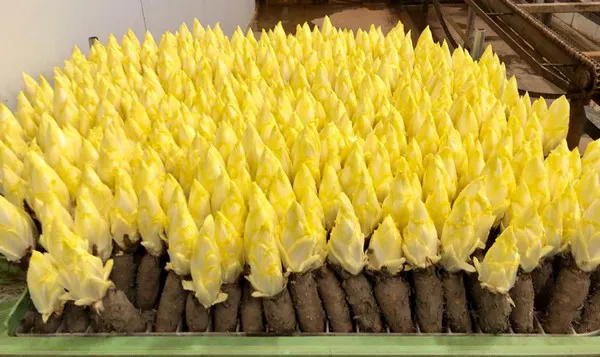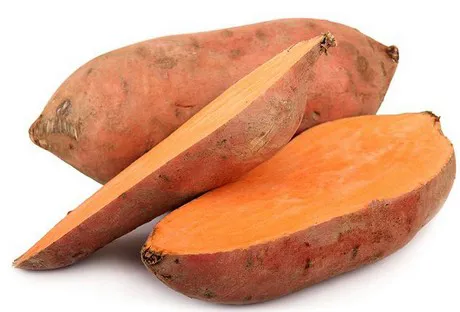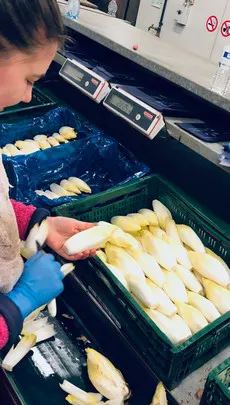REO Veiling in Roeselare, Belgium, ended 2019 with a record turnover of €208 million, making it this auction house’s best year ever. For the second year in a row, tomatoes were the most important product, followed by leeks. Despite greenhouse vegetables’ growing share, REO Veiling is investing a great deal in new products. Two fairly new products within this company’s range are sweet potatoes and organic chicory.

Organic chicory is a new product of REO Veiling
“Sweet potatoes are a product that needs warmth and are usually cultivated in warmer regions. However, thanks to innovative cultivation methods and progressive knowledge in the field, it is becoming increasingly possible to grow this product right here, in Flanders,” says Martine Ingels, REO Veiling’s Leek and Sweet Potatoes Product Manager.
“Farmers have not been growing sweet potatoes in West Flanders for three years. On a worldwide scale, sweet potatoes are now one of the most cultivated crops. Here in Belgium, we see sweet potatoes’ popularity increasing every year too. It has become a product that is available in all supermarkets and greengrocers.”

Year-round Belgian sweet potatoes
“Three years ago, we began a sweet potato cultivation project with our largest sweet potato buyer. In the beginning, these Belgian sweet potatoes were only available for a short time. However, we see the season lengthening every year. Our goal for the future is to offer sweet potatoes year-round,” says Ingels.
“Our largest buyers can then supply their clients with locally-grown sweet potatoes all year long. The biggest challenge for growers is, however, learning to master this product’s storage requirements. They must be able to store this product in the best conditions possible and, so, maintain their quality. This year, we can offer sweet potatoes from October to mid-March, and, probably, a little longer.”
Competing with imported product
Although sweet potatoes have become increasingly popular in recent years, Belgian sweet potatoes have significant competition from the imported product. “This product has been grown for much longer in other countries. These places include Spain, the United States, and countries in Africa. Labor is also cheaper there. They can, therefore, bring their sweet potatoes onto the market at lower prices.”
“Many buyers then prefer to buy the imported product rather than the more expensive local sweet potatoes. If we look at the Belgian sweet potatoes price evolution, we see a decline, but we cannot keep dropping the price. We hope there are still a few major Belgian retailers, who prefer locally-grown goods over imported products, that will jump on the bandwagon,” Martine continues.
“Sweet potatoes are mostly marketed through a middleman at REO Veiling. The product is mainly sold, loose, in EPS crates, but we can also offer them packaged to size. However, the cheap import sweet potatoes make it difficult to get an acceptable price for our farmers. Nevertheless, growers have the ambition to enlarge their acreage. The farmers have invested a lot of money in sweet potato cultivation methods and want to expand. They certainly see a future in this product.”
 Organic chicory
Organic chicory
The latest product in REO Veiling’s assortment is organic chicory. Annually, REO Veiling sells 19 million kg of conventional chicory. From January 2020, the company started selling organic chicory. “We currently have a single producer who grows organic chicory for us and only one buyer. We are hard at work offering this organic chicory to other buyers, but demand is still slightly lacking. In the future, we hope to not only grow our supply but the number of buyers too,” says Leslie Mareco, Chicory Product Manager at REO Veiling. At the moment, REO Veiling offers organic chicory in 500g Flowpacks and 6 pieces in EPS-T packaging.
“Growers see a future in chicory again”
“We have been putting a lot of effort into chicory’s quality in recent years. We do that by compensating growers extra for better quality products. Those who do well earn more. This bonus is a strong incentive for farmers to keep striving for good quality chicory. For the future, we are looking toward further segmentation.”
“We are inspired by our neighboring countries and what the chicory landscape looks like in those countries. Young producers are moving back into the field of cultivation, and we are expecting an acreage expansion. We are working on our position in France too, by offering French chicory. We work with French chicory farmers who offer their wares to REO Veiling to be sold at auction,” concludes Leslie.

